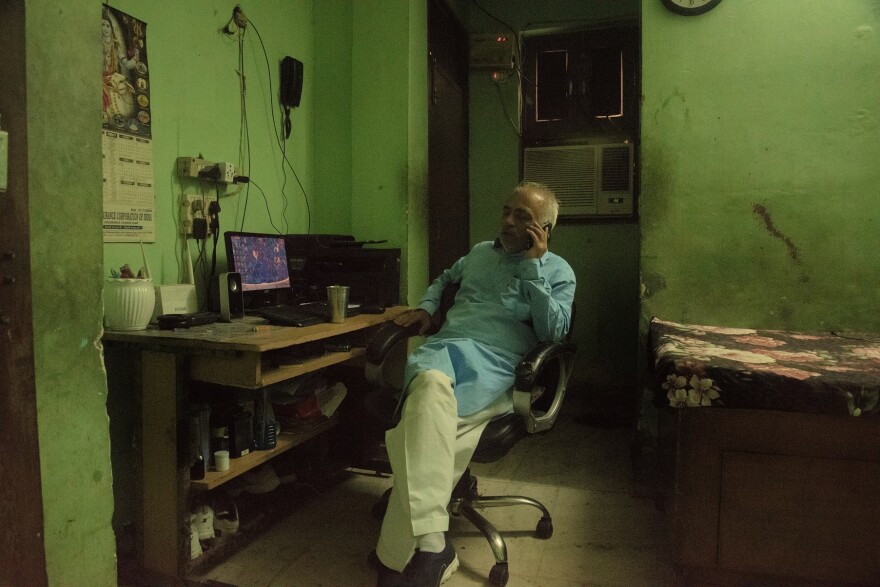All over the world, Sanjoy Sachdev was lauded as India's cupid.
Sachdev shelters couples on the run who defy the country's norm of arranged marriage. But one day, some of those couples decided they had to take him down. Why?
NPR's new podcast series Love Commandos from Rough Translation examines how Sachdev and his group became villains in the eyes of many of the people they promised to help.
Who is he? Sachdev founded the Love Commandos, a Delhi-based group that, for nearly a decade, ran a safehouse for young lovers fleeing threats of violence.
But in 2019, Sachdev and the other Commandos were arrested on charges of wrongful confinement and extortion – allegations from the very couples they promised to help.
What's the big deal? In India, around 95% of marriages are arranged by families, usually within the same caste or religion.
People who marry for love, without their parents' permission, challenge those boundaries. As a result, many have been ostracized, kidnapped or even killed by their families or communities.
And some of them reach out to the Love Commandos, desperately seeking the services the group has advertised for about a decade:
- Help navigating the Indian marriage registration system to obtain paperwork that can validate their union in the eyes of the law.
- Advice about how to start their new lives when their own families have rejected them, or when people in their lives still pose a threat to their safety.
- A promise of protection, free of charge, and a place to stay, sometimes for months on end.
NPR reporter Lauren Frayer and Love Commandos series co-host Mansi Choksi have spoken to more than 30 people who took up the Commandos' offer of protection. For many of them, their time in the safehouse was anything but safe. They allege that the Commandos:
- Pressured them for money, at times demanding everything they had in their pockets or in the bank.
- Withheld their cellphones, IDs, and other important documents, in an attempt to keep them at the shelter as long as possible.
- Forced them to perform free labor, including cooking and cleaning, not just for themselves, but for other couples in the shelter, and in the private homes of Love Commandos volunteers.
- Fostered an atmosphere of manipulation and abuse, by threatening to reveal their location to their families, making casteist and Islamaphobic remarks, and tormenting them with dogs when they refused to do as they were told.
In 2019, some of these couples alerted local authorities. Sanjoy Sachdev and other Love Commandos volunteers deny their accusations, and some other couples who passed through the shelter say they didn't witness this kind of behavior.
Want the full story? Listen to NPR's new podcast series Love Commandos from Rough Translation.
What are people saying?
On how Sachdev could have missed the discontent brewing in the shelter:
- Rough Translation podcast host Gregory Warner: "One thing we know about Sachdev, from his friends and his enemies, is that Sachev was always a man in need of an audience. [It's not hard to imagine] that Sachdev might also be someone who liked to play the role of revolutionary under the captive gaze of young onlookers.... It may have served his image of himself to steadily ignore the fact that so many couples wanted so desperately to leave."
On the consequences of the Commandos' arrest in India:
- Journalist Mansi Choksi, who co-hosts the Love Commandos series: "It reinforces the fact that once you cross the invisible lines of the caste system, you are going to fall into trouble. So if it's not an honor killing, you're going to be trapped in [a] scam.... Here, you have someone who was promising to protect you for challenging the caste system, but the real thing is that he is going to defraud you."
On the challenges that couples face after leaving the Love Commandos shelter:
- NPR reporter and former India correspondent Lauren Frayer: "Almost every couple I've talked to has reconciled with part of their family, but not all. [One couple] left the country, put an ocean between themselves and both families. But not one couple that I've talked to has concluded, 'That's it, I'm not going to talk to my family anymore.' None of these couples have abandoned their families, even though their families have abandoned them."

So what now?
- The criminal trial of Sanjoy Sachdev and other members of the Love Commandos is ongoing, four years after their arrest. Some couples from the shelter have testified. Sachdev has appeared in court, but lawyers say it could be another few years before a verdict is reached, if at all.
Other organizations provide similar services to the Love Commandos in India: Dhanak of Humanity runs a support group for interfaith and inter-caste couples, the India Love Project highlights the love stories of couples from all stripes, and as of 2021, the Delhi municipal government was operating a co-ed safehouse for couples in need. None of them, though, cover all of the services the Love Commandos provided.
Learn more:
- Listen to all five episodes of Love Commandos from NPR's Rough Translation, wherever you get your podcasts.
- Read correspondent Lauren Frayer's companion article about one couple who passed through the Love Commandos shelter.
- Read host Gregory Warner's conversation with a woman who mentors interfaith couples to help them mitigate the risk of becoming victims of violence.
- Check out "The Newlyweds: Rearranging Marriage in Modern India" by Mansi Choksi, which chronicles the harrowing love stories of couples across the country.
Luis Trelles, Mansi Choksi and Raksha Kumar contributed to this report. contributed to this story
Copyright 2023 NPR. To see more, visit https://www.npr.org.






